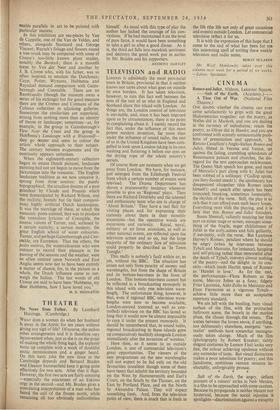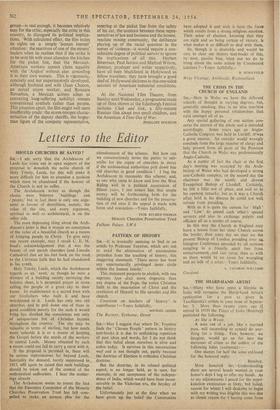CINEMA RomeoandJuliet. (Odeon, Leicester Square. —Salt of the Earth. (Academy.)
A Time Out of War. (National Film Theatre.)
ONE, doubts whether the cinema can ever come satisfactorily to grips with the great Shakespearian tragedies: cut the poetry, as Welles did in Macbeth, and you are dealing in the currency of melodrama; retain the poetry, as Oliver did in Hamlet, and you are confronted with scarcely surmountable prob- lems of presentation and approach. In Renato Castellani's Anglo-Italian Romeo and Juliet, filmed in Verona and Venice, set against the fading, crumbling splendours of Renaissance palaces and churches, the dis- regard for the text approaches recklessness. The Queen Mab speech has gone, and most of Mercutio's part along with it; Juliet has been robbed of a soliloquy (`Gallop apace, you fiery-footed steeds'); the apothecary has disappeared altogether (this Romeo stabs himself); and speech after speech has been truncated, breaking, sometimes lamentably, the rhythm of the verse. Still, the play is so rich that it can afford even such heavy losses. Everything rests With the playing, and it is here that this Romeo and Juliet founders.
Susan Shentall, valiantly essaying her first part on either stage or screen, manages some- thing of the fragile, eager childishness of Juliet in the early.scenes and fails gallantly, if inevitably, with the verse. But Laurence Harvey's Romeo, petulant where he should be angry (when he intervenes between Tybalt and Mercutio, for instance), hangdog and self-pitying rather than remorseful after the death of Tybalt, conveys almost nothing of the poetry—and the delight in its con- ceits—Which made Hazlitt speak of Romeo as `Hamlet in love.' As for the rest, the performances—Flora Robson as the nurse, Mervyn Johns as a fussy, fidgety Friar Laurence, Aldo Zollo as Mercutio and Enzo Fiermonte as a vigorous Tybalt- achieve little more than an acceptable repertory standard.
We are left with the bustling, busy visual surface of the film, with the protracted ballroom scene, the brawls in the market place, the chases through the streets. The scenes between the lovers move, if anything, too deliberately; elsewhere, energetic `neo- realist' methods have somewhat incongru- ously taken charge. Much of the film (photography by Robert Krasker; richly elegant costumes by Leonor Fini) looks very fine, the colour achieving opulence without any surrender of taste. But visual distinction makes a poor substitute for poetry; and this handsome, ambitious venture remains in- eluctably, unforgivably prosaic.
Salt of the Earth, the angry, defiant account of a miners' strike in Ne'v Mexico, is a film to be approached with some caution. Because its propaganda is neither blatant nor hysterical, because the social injustice it spotlights—discrimination against a mingrity
group—is real enough, it becomes relatively easy for the critic, especially the critic in this country, to disregard its political implica- tions. With calculated effect, the film trains its sights on a simple 'human interest' situation: the reactions of one of the miners' leaders when he realises that if the strike is to be won his wife must abandon the kitchen for the picket line, that the Mexican- American workers cannot claim equality with the `Anglos' without also conceding
' it to their own women. This is vigorously, concisely and not unpersuasively developed, although husband and wife (Juan Chacon, an actual union worker, and Rosaura Revueltas, a Mexican actress adept at conveying long-suffering nobility) remain conventional symbols rather than people. This situation apart, the film might well seem insufferably crude: the storm-trooper charac- terisation of the deputy sheriffs, the bogey- man figure of the company representative,
sneering at the picket line froin the safety of his car, the contrast between these repre- sentatives of law and business and the honest, resolute mining community, the deliberate playing up of the racial question in the scenes of violence—it would require a con- siderable degree of political naivete to ignore the implications of all this. Herbert Biberman, Paul Jarrico and Michael Wilson, director, producer and writer respectively, have all been blacklisted in Hollywood as fellow travellers: they have brought a good deal of Hollywood slickness to this one-sided account of American industrial conditions.
At the National Film Theatre, from Sunday until Wednesday, a programme'made up of films shown at the Edinburgh Festival includes Chuk and Gek, a fifty-minute Russian film about two small children, and the American A Time Out of War.
PENELOPE HOUSTON



































 Previous page
Previous page